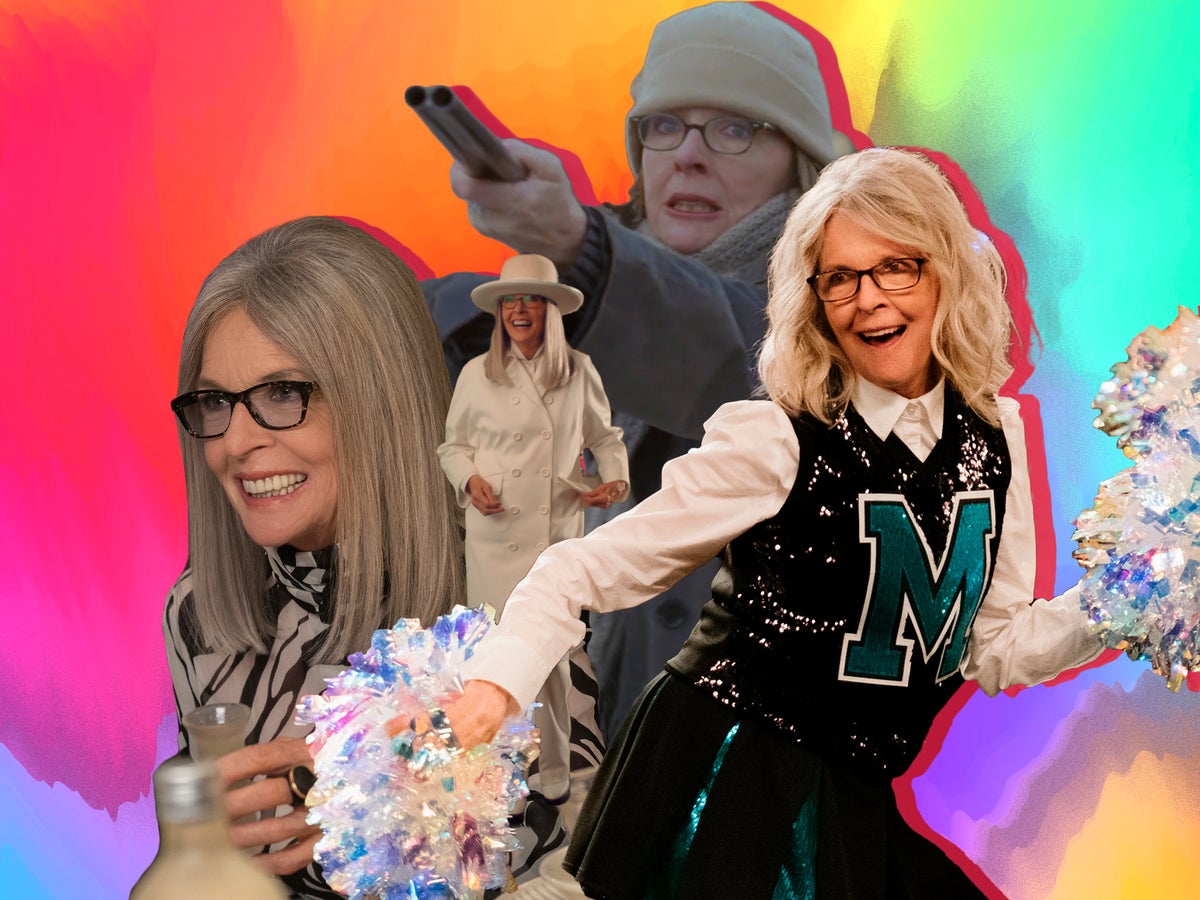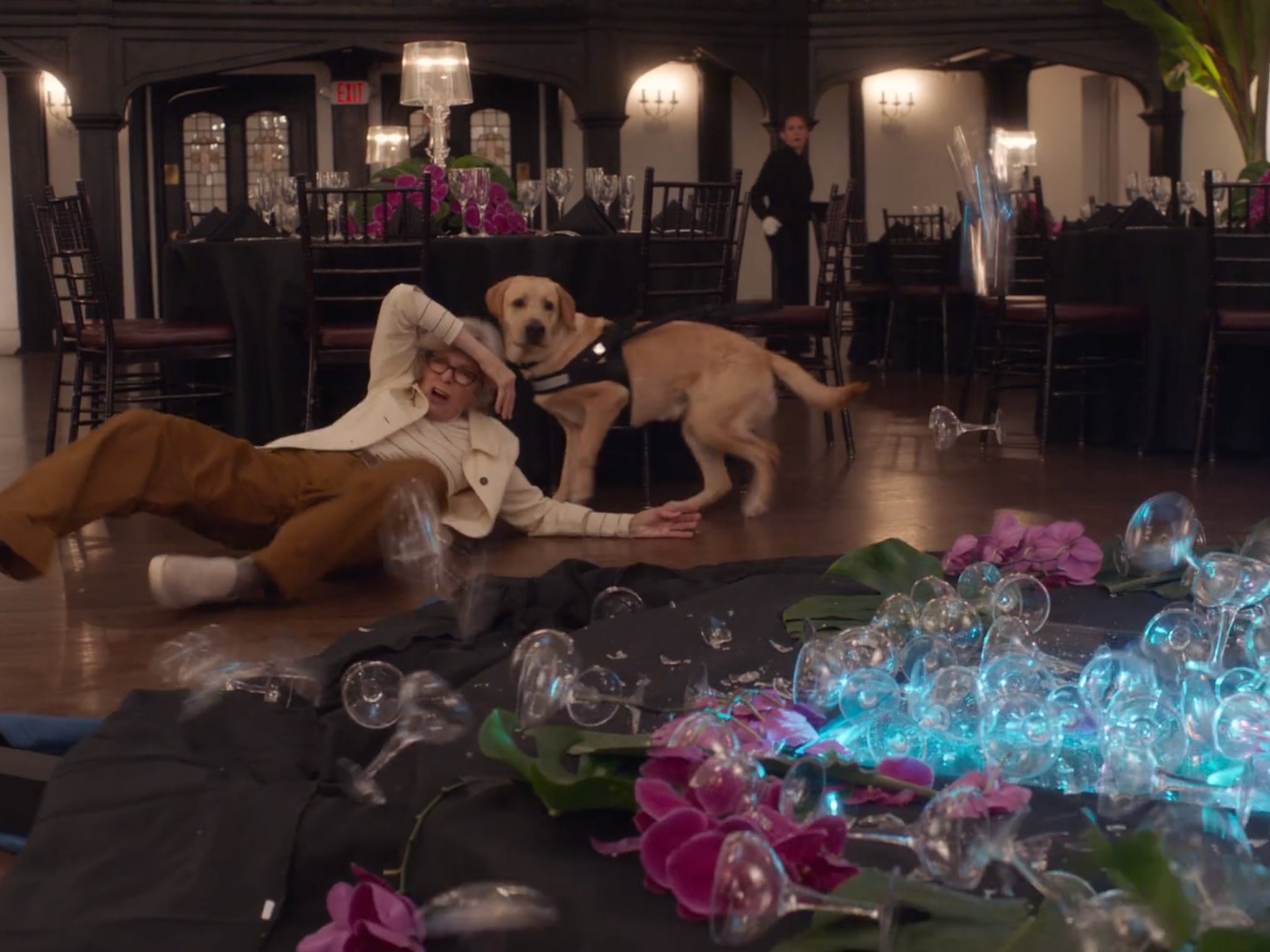
A few years ago, all I could talk about was a movie in which Diane Keaton gets addicted to meth. I’d pester friends and loved ones about it, needing them to see the sheer chaos I’d witnessed. “It’s on Prime Video right now! For free! Go watch it!” This was Breaking Through, a 2003 made-for-television film that saw Keaton play a struggling single mother who resorts to drug dealing to make ends meet. Before you know it, she’s jonesing after the hard stuff herself. Trust me: there is life before Breaking Through, and life after. I have never seen an Akira Kurosawa film, but I have seen Annie Hall lick the leftovers from an empty bag of crank.
Breaking Through is the kind of movie that can only be found today by rooting around the arse-end of Amazon, but it’s also one of the most significant films Keaton has ever made – a mortifying blueprint for the actor’s modern career. Call it the Flustered and Unhinged Diane Keaton Cinematic Universe, where up is down, down is up, and her dialogue has been replaced with yelps and confusion. Today the star of The Godfather and many of Woody Allen’s better ones seems to be endlessly frogmarched into surreal calamities so individually deranged that they sound made up.
Book Club: The Next Chapter, in cinemas now, finds Keaton at her most straight. But even then she is pretzel-shaped, flailing and harrumph-ing herself across European tourist traps. The sequel to the first Book Club, from 2018, casts Keaton as one of a quartet of women (Jane Fonda, Candice Bergen and Mary Steenburgen are the others) who jet off to Italy to guzzle prosecco and make jokes about penises. Played like a series of flappy vignettes, the film has the feel of an improv exercise, the women hurling themselves into disconnected mishaps and musical numbers, with even the central book club motif from the first film forgotten about within minutes. They don’t talk about Where the Crawdads Sing even once!
But Book Club 2 and movies like them – say, the recent “broads go to the Super Bowl” comedy 80 for Brady – aren’t designed to tell stories as much as they’re designed to lull us into feelings of cosy comfort. It’s why their stars essentially play loose versions of their assumed off-camera personas. In Book Club 2, Fonda is the bawdy sex goddess, Bergen the dry professional, Steenbergen the cheery optimist. Keaton, meanwhile, is the neurotic flibbertigibbet to whom marital convention sits uneasily, a woman endlessly decked out in belts and cream-coloured turtlenecks. She’s even named Diane, for god’s sake.
Keaton is the queen of these kinds of performances, all of which seem to forgo character for an appropriation of the “idea” of Diane Keaton. “Yeah, well, uh – gee!” her characters proclaim in a mock daze when faced with an incredibly low-stakes catastrophe. Her recent filmography is dominated by projects that have official titles but may as well have been released in quicker shorthand, à la the Carry On franchise, or things starring Abbott and Costello: Diane Keaton Robs a Bank (Mad Money); Diane Keaton Falls for a Vagrant (Hampstead); Diane Keaton Joins a Cheerleading Squad (Poms); A Young Woman Becomes Diane Keaton Via a Mystical Tanning Bed (Mack & Rita). Just last week I received a press release about a new movie called Arthur’s Whisky, in which Keaton, Patricia Hodge and Lulu (!) down a supernatural elixir that makes the world see them as twenty-somethings. Diane Keaton Gets Magically Sloshed? These aren’t films – they’re products of an industry that has no idea what to do with one of our greatest living talents.
Somewhere along the line, Keaton’s cinematic speciality became an exaggerated version of a memorable scene in her 2003 film Something’s Gotta Give, in which director Nancy Meyers swirls her camera around Keaton as she cries and cries over the course of several days. It’s the comic highlight of the movie – an elegant romcom that pairs Keaton’s glamorous playwright with Jack Nicholson’s devil-may-care cad – but it’s also not the movie. Keaton plays the scatterbrained Erica as focused, rational, sexy and a mess; it’s a complex performance that certainly tangles with loopy maximalism but isn’t overwhelmed by it. It earned her an Oscar nomination.
Where did that Diane Keaton go? Whether it’s to do with the directors she’s been working with of late, or the sheer paucity of good parts for women in their seventies, her performances have become uniformly chaotic – like someone attempting to draw an approximation of Diane Keaton from memory. The look is always right, from the chic spectacles to the ostentatious hats, but there’s something hollow about the soul of it all, as if Diane Keaton is wearing a Diane Keaton mask.

When she does reappear in sparkling, human form, I feel like screaming for joy. I found myself strangely moved by the little-seen 5 Flights Up, for example, a downbeat 2014 comedy – released in the UK as Ruth & Alex – in which she and her husband (Morgan Freeman) try to find a new apartment. That’s pretty much the gist of it, and yet Keaton is captivating. She retains that anxious, tongue-tied quality that made a generation fall in love with her in Annie Hall and Manhattan, mixed in with the cosmopolitan elegance that carried her through the Eighties, in films such as the working-mother comedy Baby Boom. But there’s also a quiet wisdom to her work in it, a wonderful sense of restrained maturity. But then I try to watch Mack & Rita on a plane (Did in-flight entertainment even exist before the dawn of the Flustered and Unhinged Diane Keaton Cinematic Universe?), and I pray for bad turbulence. Everything is manic. Everything is shrieked. Everything is “eccentric” in capital, lit-up letters.
More disappointing is the fact that – off-camera, at least – Keaton remains one of the most interesting actors in Hollywood. She’s always had a curious career outside of film: releasing coffee table books of photographs of houses, directing documentaries about the afterlife, producing Elephant, Gus Van Sant’s school shooting movie. Her memoirs are prickly, complicated stories of broken families and regret – Brother & Sister, released in 2019, charted her relationship with her younger brother Randy, who has experienced mental illness throughout his life. Even in interviews, she’s far more interesting when talking about how much she loves cutting words and pictures out of magazines, or how she can often be found roaming Los Angeles taking photographs of abandoned storefronts. I want that movie! Not another one involving magic or body swaps or (god forbid) hard drugs. Essentially, I want to rescue Diane Keaton from “Diane Keaton”.
‘Book Club: The Next Chapter’ is in cinemas







